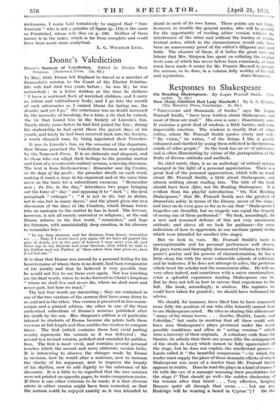Donne's Valediction
Donne's Sermon of Valediction. Edited by Evelyn Mary Simpson. (Nonesuch Press. 12s. 6c1.) IN May, 1619, Donne left England to travel as a member of Doncaster's mission to the Court of the Elector Palatine. His wife had died two years before ; he was ill ; he was melancholy ; in a letter written at the time he declares 4. I leave a scattered flock of wretched children, and I carry an infirm and valetudinary body, and I go into the mouth of such adversaries as I cannot blame for hating me, the Jesuits, and yet I go." His reluctance was no doubt increased by the necessity of breaking, for a time, a tie that he valued, the tie that bound him to the Society of Lincoln's Inn. Nearly thirty years before he had: first joined the Inn ; during his studentship he had spent there the gayest days of his youth, and lately he had been received back into the Society, a much changed man, by being appointed their Preacher.
It was to Lincoln's Inn, on the occasion of this departure, that Donne preached the Valediction Sermon now reprinted by the Nonesuch Press. It is an elaborate and eloquent, and to those who can adapt their feelings to the peculiar matter and form of a seventeenth-century sermon, a moving discourse. The text is from Ecclesiasticus : Remember now thy Creator, in the days of thy youth ; the preacher dwells on each word, making it mark a stage in his argument and at the same time serve as the basis for a subordinate excursus. " Remember now ; In Die, in the day," introduces two pages bringing out the force of " day " and opposing it to " dark " ; the next paragraph " enlarges" : " it is not in die, but in diebus, not in one, but in many dayes," and the plural gives rise to a discussion of the days of the Creation, .which Donne twists into an analogue to the matter he has in. hand. The fervour, however, is not all merely oratorical or religious ; at the end Donne returns to his first word, " remember," and begs his listeners, with unmistakably deep emotion, in his absence to remember him : " In my long absence, and far distance from hence, remember me. . . . That if I never meet you again till we have all passed the gate of death, yet in the gate of heaven I may meet you all, and there say to my Saviour and your Saviour, that which he said to his Father and our Father, of 'those whom thou halt given me, have I not lost one.'"
It is clear that Donne was moved by a personal feeling for his hearers (some of whom there is no doubt, had been companions of his youth) and that he believed it very possible that he would not live to see them ever again. Not less touching are his final words, where he looks forward to Christ's kingdom " where we shall live and never die, where we shall meet and never part, but here we must."
The last four words are interesting.: they are contained in one of the two versions of the sermon that have come down to us, and not in the other. One version is preserved in two manu- scripts and a pirated edition, the other in one of the three authorized collections of Donne's sermons published after his death by his son. Mrs. Simpson's edition is of particular interest to students of Donne because she prints both these versions at full length and thus enables her readers to compare them. The first (which contains those four vivid parting words) represents the sermon as it was delivered ; the second is a revised version, polished and emended for publica- tion. The first is most vivid, and contains several personal touches which the second and more elaborate version lacks. It is interesting to observe the changes made by Donne in revision, how he would alter a sentence, now to increase the clarity of his argument, now to improve the beauty of his rhythm, now to add dignity to the substance of his discourse. It is a little to be regretted that the two versions were not printed on opposite pages, to make comparison easier. If there is one other criticism to be made, it is that obvious errors in either version might have been corrected, so that the sermon could be enjoyed exactly as it was intended to stand in each of its two forms. These points are not likely, however, to trouble the general reader, who will be grateful for the opportunity of reading either version without the interference of the other and without the burden of minute textual notes, which in the circumstances would only have been an unnecessary proof of the editor's diligence and good faith. The absence of these, if it belies the great care and labour that Mrs. Simpson has spent on collating the original texts (one of which has never before been examined), at least must have made it easier for Mr. Francis. Meynell to present the sermon, as he does, in a volume fully worthy of his skill






































 Previous page
Previous page